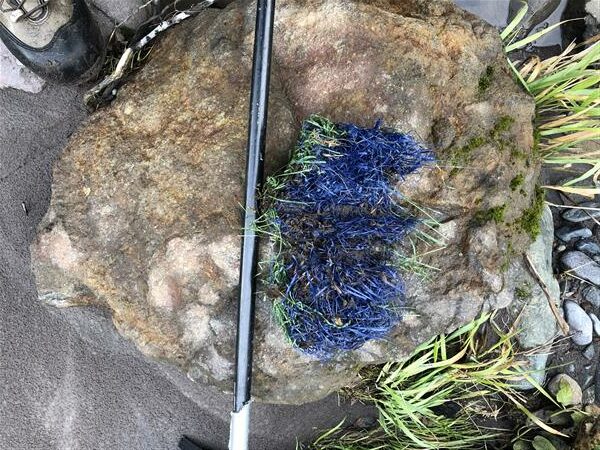
Electron Hydro dam could face largest fine for environmental crime in Washington history
Listen
(Runtime 1:26)
Read
Electron Hydro dam and its chief operating officer could be forced to pay the largest fine and restitution for an environmental crime in Washington state history.
COO Thom Fischer and Electron Hydro, LLC. pleaded guilty to a gross misdemeanor permit violation for allowing the toxic contaminants crumb rubber and artificial turf to flow into the Puyallup River during a construction project.
During the summer of 2020, workers under Fischer’s supervision placed artificial turf and crumb rubber into the riverbed and dam as part of a temporary bypass channel during construction. Water flow ripped the plastic liner over the material and released it into the river over a period of days, from July 24 to Aug. 5, according to the criminal charges filed by Bob Ferguson, Washington state attorney general.
According to a press release filed by the AG’s office, “University of Washington-Tacoma Center for Urban Waters researchers tested samples of recovered field turf and crumb rubber and discovered that it contained chemicals found in tires, including one that is ‘extremely toxic’ to coho salmon.’”
Fischer pleaded guilty to the gross misdemeanor charge last week.
Ferguson’s office is recommending the company pay $1 million, which includes a restitution payment of $745,000 toward the health of the Puyallup River and a $255,000 fine to Pierce County. A Pierce County superior court judge must agree to the terms of the plea.
That’s not enough for the Puyallup Tribe, who has long fought for the health of salmon and the river, said Lisa Anderson, the environmental attorney for the tribe.
“I’m not sure overall, long term, what the significance of those large fines are,” Anderson said.
In November, Electron Hydro also was fined $100,200 from the Washington State Department of Ecology and made to pay $400,800 toward an ecology-approved environmental improvement project in the Puyallup River watershed.
Anderson said if the dam continues to operate as-is, it will continue to have a negative impact on the river and fish.
“The only ultimate way to lead to salmon recovery and undo the impacts of this dam, is for the dam to be removed,” Anderson said.
Angelo Calfo is the attorney for Electron Hydro and Thom Fischer. Calfo said the use of the liner was to protect the river, and that this was an unintended accident.
“It was intended to provide a cushion for a plastic liner that was going to be placed in a riverbed where the water would be diverted so that construction on the main project could continue,” Calfo said. “It was never to touch the water, but, because of a high flow water event, the liner tore.”
Electron Hydro did not receive permission to use crumb rubber and artificial turf, according to the press release from the state attorney general.
Prior to the pollution event in 2020, the dam was harming fish, Anderson said. She said the tribe has worked with the former and current owner to come in compliance with the Endangered Species Act but that those efforts have been unsuccessful.
The tremendous force from the water rushing through the penstocks and the generators essentially pulverizes juvenile fish, and dewatered areas lead to less salmon spawning, Anderson said. She also said Electron Hydro has regularly manipulated the river flow away from a fish ladder constructed on the dam in 1983.
“Therefore, adult fish are missing miles of habitat for spawning upstream due to the blockage and impediments to entering what was once a functioning fish ladder,” Anderson said in an email.
Anderson pointed out that some operational changes have resulted in a positive impact for fish, such as when the dam closed an intake. With that closure, Anderson said the river was allowed to naturally flow into the dewatered segment of the river.
“We have seen unprecedented levels of spawning in that segment since the intake has been closed,” Anderson said. “We are seeing steelhead returning numbers that we have never seen before.”
The tribe is currently involved in an ongoing lawsuit in federal court against Electron Hydro for claims that the company violated the Endangered Species Act, and the tribe is co-party with the United States Environmental Protection Agency in ongoing litigation for claims that Electron Hydro violated the Clean Water Act.
Tribal biologists are still finding polluting matter in the river from the 2020 incident. As recently as two weeks ago, Anderson said they found a three-foot by three-foot piece of artificial turf.
While Anderson acknowledges how difficult it would be to remove all the small crumb rubber from the river, she said biologists are finding large pieces of turf just by walking along stream banks.
Calfo said Electron Hydro began cleanup immediately after the incident. An independent party was hired by the company in November 2020 to identify material in the river and the party has rarely found any of the material, Calfo said. He disagreed with the claim that pollutants still being found and said people who say they have found material have not notified the company.
The sentencing date for Fischer is May 5.















